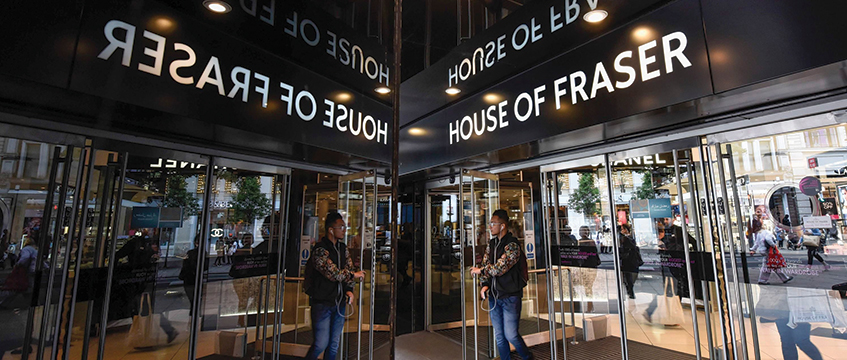House of Fraser is forging ahead with its store closures after settling its legal battle with a group of landlords over its company voluntary arrangements.
While the initial dispute highlighted the industry’s increasing defiance against the controversial insolvency process, which enables companies to close stores and cut rent bills, the outcome has garnered some scepticism from critics.
The settlement
The landlords – Lunar Altrincham, which owns HoF’s Altrincham store, Autumn Properties, which owns its shop in Birkenhead, and Eden Commercial, which has a store in High Wycombe – had claimed the CVA was “unjust” and “prejudiced towards a targeted group of creditors”.
But the trio dropped the legal challenge over the weekend, days after Chinese retail group C.banner International Holdings called off its plans to invest £70m in the department store.
The approval of the CVA was a stipulation for the cash injection. Until last week, C.banner had been delaying its investment until legal proceedings with the group were resolved.
Therefore the agreement, which will allow HoF to close 31 of its 59 stores next January, will boost the department store’s hopes of a rescue. Terms of the settlement, which have not been disclosed, are thought to have included financial compensation.
A spokesperson for the retailer says that now the challenge has been dropped, HoF will focus on “concluding discussions with interested investors as per the original timelines set out by the business”, having removed the “risk to those discussions presented by this legal process”.
Limited impact
Mark Fry of Begbies Traynor and Charlotte Coates of JLL, who represented the landlords, say in a joint statement: “Although we will not have our day in court, we are pleased with the outcome and hope that our landmark legal challenge sends a clear message to any other companies considering a CVA, on the importance of transparency and fair treatment for all creditors throughout a CVA process.”
The group says that by threatening legal proceedings, it has issued a warning to other retailers that could similarly be considering a CVA.
“We believe that thanks to our actions, landlords in future CVAs will be in a far stronger position to challenge what we regard as unfair treatment and demand greater transparency from companies and their nominees from the outset,” say the lawyers.
However, real estate legal experts reckon that on the whole, the outcome will have a limited effect on the industry.
Barry Gross, a partner at Bryan Cave Leighton Paisner, says: “What’s interesting is they made the challenge on the basis the CVA was unfair, not transparent and did not treat landlords fairly.
“It is only those landlords in particular that have now agreed to an unknown settlement, effectively outside of a CVA, while any landlord not involved is in no better a position than before.
“If you want an outcome that ensures fairness and transparency, this is the least transparent route to achieve it with. It may be a great deal for those landlords, but has no benefit whatsoever to the other landlords.”
Picking the wrong battle
Moreover, landlords may have faced a losing battle from the get-go by picking House of Fraser to contend with.
“HoF remains in a precarious position. This may prove to be a short-lived victory if it fails to secure the funding it needs. Those landlords won’t necessarily be feeling so clever if it falls into administration – they will be left with the other landlords awaiting their final fate,” says Gross.
In any case, the gamble that any international company with deep pockets would not let a retailer go to insolvency did not pay off.
Another lawyer, who is involved in the ongoing proceedings, said that landlords could have had more success on challenging New Look’s CVA, since parent company Brait and its bondholders would not have allowed the retailer to slip into insolvency.
He adds: “If [HoF’s] landlords really felt strongly about the principle of the matter, they should have taken it to court.”
The call for change
While the aborted dispute has shed some light on dissent in the property community, the government continues to face calls for a more meaningful and in-depth review of CVAs among concerns they are being “misused”.
Continued legal proceedings would likely have fortified this position, but for now the industry is hoping the outcome has raised sufficient awareness of the subject.
Mark Williams, president of retail property organisation Revo, says: “House of Fraser is a business that has been under-invested in for many years and that’s the ultimate reason for its failure.
“Landlords are motivated to work with the retail industry, as evident here, and absolutely want to avoid these situations, but the fact is that the inherent weaknesses of the CVA process remain, as this particular case demonstrates, and this needs to be urgently addressed by the industry and by government.”
The landlords that began proceedings against HoF may have gained some marginal financial advantage as a result, but they still may lose out through the company’s prospective demise. It remains to be seen if the landlords subject to future similar proceedings will see any benefit from the case.
To send feedback, e-mail pui-guan.man@egi.co.uk or tweet @PuiGuanM or @estatesgazette











